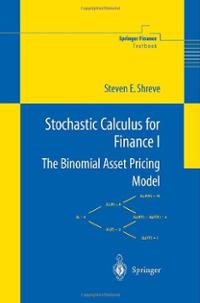
|
FreeComputerBooks.com
Links to Free Computer, Mathematics, Technical Books all over the World
|
|
- Title: Stochastic Calculus and Finance
- Author(s) Steven E. Shreve
- Publisher: Springer; 2004 edition (June 28, 2005); eBook(Draft)
- Hardcover/Paperback: 202 pages
- eBook: PDF, 384 pages, 1.2 MB
- Language: English
- ISBN-10/ASIN: 0387249680
- ISBN-13: 978-0387249681
- Share This:

|
Stochastic Calculus for Finance evolved from the first ten years of the Carnegie Mellon Professional Master program in Computational Finance. The content of this book has been used successfully with students whose mathematics background consists of calculus and calculus-based probability.
The book gives both precise statements of results, plausibility arguments, and even some proofs, but more importantly intuitive explanations developed and refine through classroom experience with this material are provided. The book includes a self-contained treatment of the probability theory needed for stochastic calculus, including Brownian motion and its properties. Advanced topics include foreign exchange models, forward measures, and jump-diffusion processes.
This book is being published in two volumes. The first volume presents the binomial asset-pricing model primarily as a vehicle for introducing in the simple setting the concepts needed for the continuous-time theory in the second volume.
About the Authors- N/A
- Probability, Stochastic Process, Queueing Theory, etc.
- Financial Mathematics and Engineering
- Statistics, Mathematical Statistics, and SAS Programming
- Computational and Algorithmic Mathematics
- Combinatorics and Game Theory

- Stochastic Calculus and Finance (Steven E. Shreve)
- The Mirror Site (1) - PDF
- The Mirror Site (2) - PDF
- Solutions to the Exercises in Volume I and II (Yan Zeng)
- Solutions to the Exercises in Volume I (Yan Zeng) - PDF
- Solutions to the Exercises in Volume II (Yan Zeng) - PDF
-
 Stochastic Processes for Finance (Patrick Roger)
Stochastic Processes for Finance (Patrick Roger)
It describes the most important stochastic processes used in finance in a pedagogical way, especially Markov chains, Brownian motion and martingales. It also shows how mathematical tools like filtrations, Ito's lemma or Girsanov theorem should be understood in the framework of financial models.
-
 Probability for Finance (Patrick Roger)
Probability for Finance (Patrick Roger)
This book provides technical support for students in finance. It reviews the main probabilistic tools used in financial models in a pedagogical way, starting from simple concepts like random variables and tribes and going to more sophisticated ones like conditional expectations and limit theorems.
-
 Advanced Stochastic Processes (David Gamarnik)
Advanced Stochastic Processes (David Gamarnik)
This guide to Stochastic Processes covers a wide range of topics. Short, readable chapters aim for clarity rather than full generality. The objectives of the text are to introduce students to the standard concepts and methods of stochastic modeling
-
 Advanced Stochastic Processes (Jan A. Van Casteren)
Advanced Stochastic Processes (Jan A. Van Casteren)
This comprehensive guide to Stochastic Processes gives a complete overview of the theory and addresses the most important applications. Basically self-contained, it is both a course book and a rich resource for individual readers.
-
 Stochastic Calculus and Finance (Steven E. Shreve)
Stochastic Calculus and Finance (Steven E. Shreve)
The book gives both precise statements of results, plausibility arguments, and even some proofs, but more importantly intuitive explanations developed and refine through classroom experience with this material are provided.
-
 Applied Stochastic Processes in Science and Engineering
Applied Stochastic Processes in Science and Engineering
This book introduces modern concepts of applied stochastic processes is written for a broad range of applications in diverse areas of engineering and the sciences. Written for a senior undergraduate course offered to students with a suitably mathematical background.
-
 Stochastic Modeling and Control (Ivan Ganchev Ivanov)
Stochastic Modeling and Control (Ivan Ganchev Ivanov)
The book provides a self-contained treatment on practical aspects of stochastic modeling and calculus including applications drawn from engineering, statistics, and computer science.
-
 Stochastic Processes for Finance (Patrick Roger)
Stochastic Processes for Finance (Patrick Roger)
It describes the most important stochastic processes used in finance in a pedagogical way, especially Markov chains, Brownian motion and martingales. It also shows how mathematical tools like filtrations, Ito's lemma or Girsanov theorem should be understood in the framework of financial models.





